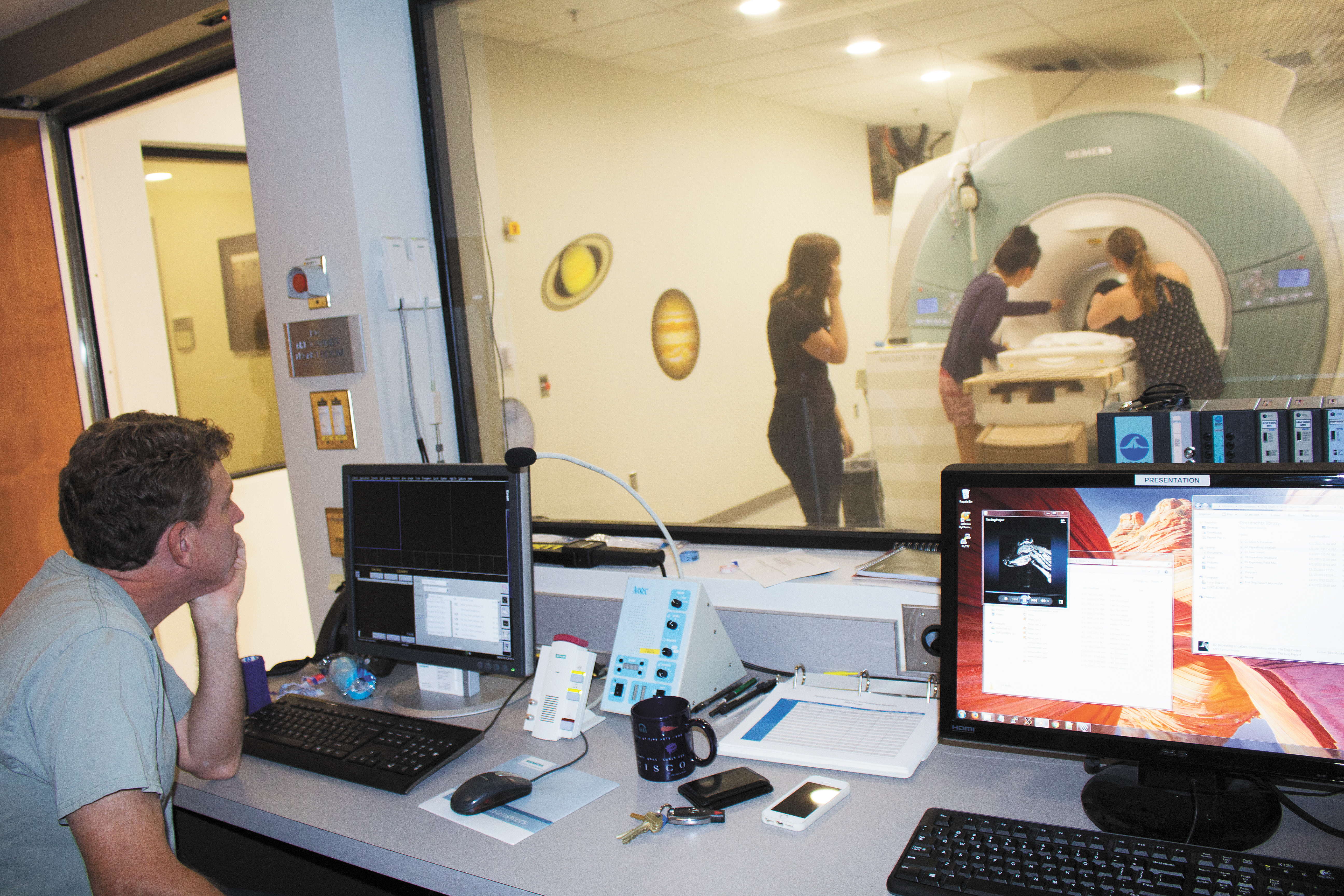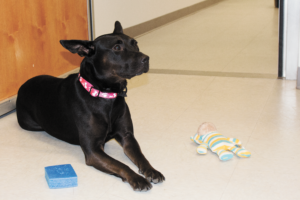Ninja, a medium-sized black pitbull-mix, walks up to the fMRI machine, a purple wrap that secures ear plugs holding down her ears. She wags her tail and climbs onto the machine’s platform as her owner walks to the other side. She then lies on the fMRI table, perfectly still for seven to 10 minutes. Her owner calls out words, both familiar and new, holding up corresponding items as directed by two graduate students. In an adjacent room, Distinguished Professor of Neuroeconomics and Director for the Center for Neuropolicy and Facility for Education & Research in Neuroscience Gregory Berns, the lead researcher, watches closely through a window to ensure that the approximately 2,000 scans of Ninja’s brain are taken accurately.
With the scans, Berns notes the changes in Ninja’s brain activity between words that she does and does not know. He is working to further understand dogs’ brains when it comes to language, in hopes of understanding more about man’s best friend.
Berns conducts fMRIs on dogs to better comprehend how their brains are structured and function.
“We’re just broadly interested in mapping the entire dog brain — how it’s wired, what parts do what, and how it does it, so we study things like reward pathways,” Berns said. “We’ve done smell, we’ve studied how they process faces, praise [and] now we’re doing some language study.”
By non-invasively mapping the perceptual and decision systems of dogs’ brains, Berns aims to learn about the neurobiological basis for individual preferences and decision-making, with applications including predicting service dog performance to their recent publication examining the impact of praise versus food. His research is funded by the U.S. Navy’s Office of Naval Research and takes place in the Psychology and Interdisciplinary Sciences Building.
Before beginning fMRI research with dogs in 2011, Berns conducted fMRI research on humans for 20 years.
“I kind of answered all the questions that I had about the human brain, and [realized] almost nobody’s doing [comparable research on dogs],” Berns said. “We were the first ones to do it in world. Now there’s a few groups doing it.”
Berns believes that in addition to better understanding decision-making processes, this research can help answer long-standing questions about dogs while improving their general welfare.
“Questions about the dogs are so fundamental,” Berns said. “A dog person myself, I want to know how their minds work. But there are bigger questions here that get to the origin of humans … because dogs have been with humans since humans have been humans. Somehow our evolutionary paths are linked to each other, so there’s also kind of this sense that by figuring out dog brains we also learn something about [ourselves].”
His curiosity about dogs merged with his line of work when he first considered training a dog to lay still in an fMRI machine.
“I saw that there was a dog on [the Osama Bin Laden] mission, and I became aware of the fact that military dogs were being trained to jump out of helicopters,” Berns said. “I figured, well, if a dog can be trained to jump out a helicopter, it can be trained to go in [an fMRI machine] … so, I put my own dog in.”
According to Berns, dogs’ behavior alone is not the ideal way to understand their thought processes, because when problems arise, dogs generally look to humans first for the solution. Because brain imaging is not a behavioral test, but rather a test of the brain that can be linked directly to behavior, it is a much more accurate way to understand dogs’ behavior.
“When we started five years ago, it was first ‘Can we do this? Can we train dogs to do this? Can we get quality data that we can interpret?’” Berns said. “From there, it’s progressed to questions about their reward system, so [as to] understand what motivates them.”
Dogs that participate in the study are chosen for their trainability, demeanor and desire to participate according to Berns. They are owned and trained by Atlanta locals, including Emory students. Periodically, the lab will advertise and hold tryouts for new dogs by going to Piedmont Park and various local dog events. The lab has recruited and trained five groups of dogs since its inception.
“Most of the people [who offer their dogs’ time] do this because they enjoy doing it and want to help the research,” Berns said. “We’ve been [paying people for scans] since we got funding, because we recognize that there’s a tremendous amount of time it takes to train the dogs, and this is on their own time … But for most people … it’s more of a token payment of appreciation that compensates for the hours it takes.”
Berns said that often, after training their dogs, owners become personally invested and place high pressure on their dogs to succeed in studies. Additionally, as the dogs aged, some scans found tumors in their brains from genetics or other unrelated factors, making the process even more impactful.
Berns received his B.A from Princeton University in physics in 1986, his Ph.D. from University of California, Davis in 1990 in biomedical engineering and his M.D. from the University of California, San Diego in 1994 before coming to Emory’s School of Medicine in 1998 as an assistant professor. Berns now uses his research and background as the basis for two classes he teaches in the College: Psychology, Canine Cognition, a consistently offered freshman seminar in the fall that gives students the opportunity to watch Berns’ research, and The Advanced Imaging Practicum, a spring hands-on research class that challenges students to design, program and execute experiments involving fMRIs.
alisha.bhatia.compton@emory.edu | Alisha Compton (19C) is from Chantilly, Va., majoring in neuroscience and behavioral biology and English, with a concentration in creative nonfiction. She previously served as Emory life editor. In addition to the Wheel, she is an undergraduate research assistant at the Grady Trauma Project, a member of the Survivor Anthology and a sister of Gamma Phi Beta sorority.







